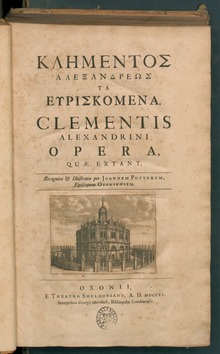Clement of Alexandria
Titus Flavius Clemens ( ancient Greek Κλήμης Ἀλεξανδρεύς Klḗmes Alexandreús ; * around 150 in Athens ; † around 215 in Cappadocia ), known today as Clemens of Alexandria (Clemens Alexandrinus), was a Greek theologian and church writer .
Life
After Clemens on the path of Platonism / Middle Platonism to Christianity had found, he traveled from his native Athens to Christian teachers including in Greece , southern Italy and Egypt . Around 175 he became a teacher at the Alexandria Catechetical School , and around 200, as the successor of Pantaenus, also its director. He stayed in Alexandria for most of the rest of his life. He had to flee Alexandria shortly before his death. Clemens tried to bring Christianity and Greek philosophy in line with one another. A lot can be learned from his works about Gnosticism , a religion that was then in competition with the young Christianity. His pupil Origen succeeded him at the catechism school.
Aftermath
Clemens enjoyed great esteem throughout late antiquity and thereafter in the East; however, his works were not translated into Latin in the Middle Ages . In 1748 Benedict XIV had him deleted from the Roman calendar of saints because his life was too little known, there was no public veneration and his teaching was doubtful. His attribution to the Church Fathers is therefore also controversial.
Clemens is ascribed a letter to a certain Theodoros in which he sent this text from a secret Gospel of Mark .
Works
In the trilogy Protreptikòs eis toùs Héllenas ( Προτρεπτικὸς εἰς τοὺς ἕλληνας 'admonition to the Greeks [resp. Pagans]' ) Clemens deals with Greek philosophers in order to convert the pagan educated classes to Christianity.
The work of Paidagogós ( Παιδαγογός , the educator ' ) is about a Christian ethic . The little script Quis dives salvetur ('Which empire will be saved') also deals with ethical questions, based on Mk 10.17-27 EU .
In his main work, the eight books of the Stromateis ( plural of στρωματεύς strōmateús 'carpet' [in the sense of 'bedspread'], 'patchwork'), Clemens tries to reconcile the fundamental compatibility of Greek philosophy and Christian faith and the epistemological superiority of the latter prove. Philosophy is presented as a still deficient preliminary stage of true knowledge ( γνῶσις gnôsis ), the possibility for this was only opened up by the parousia of Christ. But precisely in this lies the benefit of the pagan scriptures, since those who use them on the basis of the Christian faith can find in them clues for attaining the truth.
In his brief outline of the philosophical views outside the Greco-Roman world, he also mentions Buddhism and provides the oldest evidence of this world interpretation in Western literature. According to his own statement, Clemens uses an encoding, allusive and erratic style in this text (hence the title) to deny heretics access to knowledge.
With his work, Clemens made a decisive contribution to the - at the time still controversial - Christian reception of pagan philosophers and to the adoption of Platonic elements in the dogmatic system of orthodoxy that was being formed at the time .
literature
- Otto Stählin: On the handwritten tradition of Clemens Alexandrinus. Hinrichs, Leipzig 1900 ( digitized version ).
-
Clemens Alexandrinus. Edited by Otto Stählin :
- Volume 1: Protrepticus and Pedagogus. Hinrichs, Leipzig 1905 ( digitized version ).
- Volume 2: Stromata, Book I – VI (= The Greek Christian writers of the first three centuries . Volume 15). Hinrichs, Leipzig 1906 ( ZDB -ID 504606-3 ).
- Volume 3: Stromata, Book VII – VIII. Excerpta ex Theodoto. Eclogae propheticae. Quis dives salvetur. Fragments. Hinrichs, Leipzig 1909 ( digitized ).
- Volume 4: Register. Hinrichs, Leipzig 1936 ( digitized ).
- Davide Dainese: Il Protrettico ai Greci di Clemente Alessandrino. Una proposta di contestualizzazione. In: Adamantius. Volume 16, 2010, ISSN 1126-6244 , pp. 256-285 ( online ).
- Davide Dainese: Clemente d'Alessandria e la filosofia. Prospettive aperte e nuove proposte. In: Annali di Scienze Religiose. New series Volume 3, 2011, ISSN 2031-5929 .
- André Méhat: Clement of Alexandria. In: Theological Real Encyclopedia . Volume 8. De Gruyter, Berlin a. a. 1981, ISBN 3-11-002218-4 , pp. 101-113 (overview).
- Dietmar Wyrwa: The Christian appropriation of Plato in the Stromateis of Clemens of Alexandria (= work on church history. Volume 53). De Gruyter, Berlin a. a. 1983, ISBN 3-11-008903-3 (also: Berlin, Kirchliche Hochschule, dissertation, 1981/82).
- Adolf Jülicher : Clemens 9 . In: Paulys Realencyclopadie der classischen Antiquity Science (RE). Volume IV, 1, Stuttgart 1900, Col. 11-13.
Web links
- Literature by and about Clemens von Alexandria in the catalog of the German National Library
- Works (German, Church Fathers Library )
- Works (english)
Remarks
- ↑ Clemens, Stromata 1,15,71,6 ; Oliver Freiberger, Christoph Kleine: Buddhism: manual and critical introduction. Vandenhoeck & Ruprecht, Göttingen 2015, ISBN 978-3-5255-0005-7 , p. 11.
| personal data | |
|---|---|
| SURNAME | Clement of Alexandria |
| ALTERNATIVE NAMES | Clemens, Titus Flavius; Clemens Alexandrinus |
| BRIEF DESCRIPTION | Greek theologian |
| DATE OF BIRTH | at 150 |
| PLACE OF BIRTH | Athens |
| DATE OF DEATH | at 215 |
| Place of death | Alexandria |

